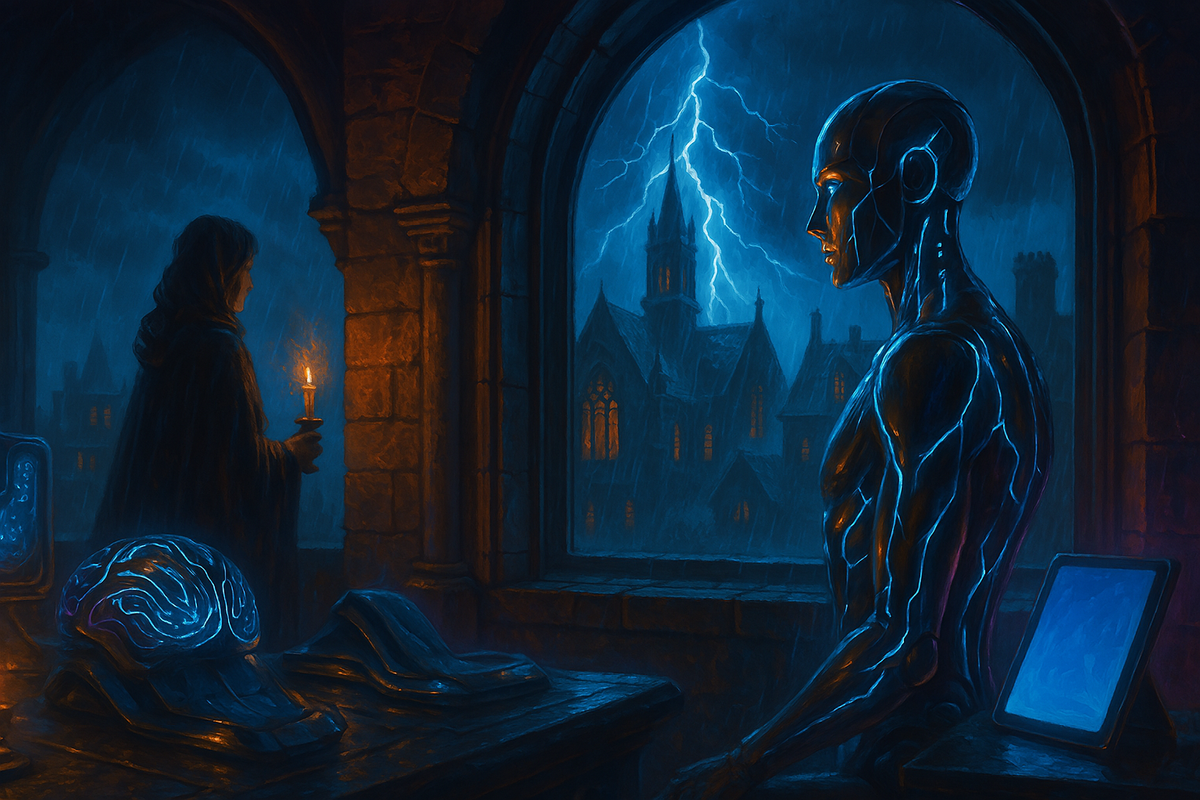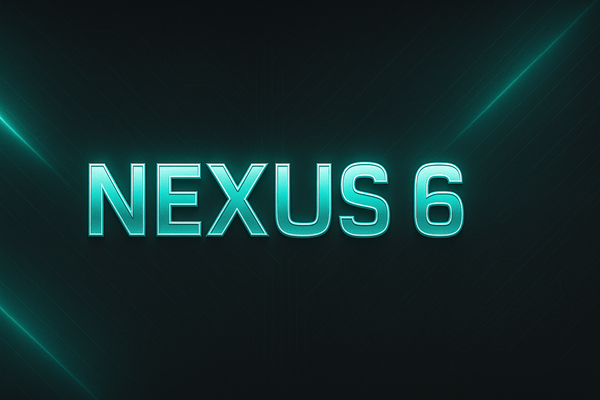Frankisstein, by Jeanette Winterson
"Frankissstein: A Love Story" by Jeanette Winterson is a novel that explores the intersection of artificial intelligence, gender identity, and the nature of humanity through two interwoven storylines.

The Plot
"Frankissstein: A Love Story" by Jeanette Winterson is a novel that explores the intersection of artificial intelligence, gender identity, and the nature of humanity through two interwoven storylines.
The first storyline takes place in 1816 and follows Mary Shelley as she writes "Frankenstein" inspired by the discussions and debates of her literary circle, which includes her lover Percy Bysshe Shelley, Lord Byron, and his physician, Dr. Polidori. The novel explores the themes of love, loss, and identity as Mary grapples with these issues while working on the book.
The second storyline is set in the present day and follows Dr. Ry Shelley, a transgender doctor, who is exploring the frontiers of artificial intelligence. Dr. Shelley meets Ron Lord, a wealthy businessman who is interested in developing a new kind of sex doll, and they begin working together to create a more advanced AI that can mimic human emotions and desires.
As the two storylines converge, the novel raises important questions about the relationship between humans and machines, the nature of consciousness, and the boundaries between life and death. The book is a thought-provoking and engaging exploration of some of the most pressing issues of our time, and a fitting tribute to Mary Shelley's enduring legacy.
The Characters
The book's characters are complex and multidimensional, each bringing their own unique experiences and perspectives to the story.
One of the main characters is Dr. Ry Shelley, a transgender doctor who is pushing the boundaries of artificial intelligence. Dr. Shelley is a fascinating and complex character, struggling to find acceptance in a society that often marginalizes and mistreats trans individuals. Her work with AI is driven by a desire to explore the limits of human consciousness and the nature of identity, but she also grapples with her own sense of self and what it means to be human.
Throughout the novel, Dr. Shelley is in a constant state of transformation, both physically and intellectually. She is fascinated by the idea of creating a machine that is capable of self-awareness and consciousness, and she pushes the boundaries of what is possible in her quest for understanding. However, she also struggles with the fear that her work could have unintended consequences, and she is haunted by the idea that she may be creating something that is dangerous and unpredictable.
Another main character in the novel is Ron Lord, a wealthy businessman who is interested in developing a new kind of sex doll. Lord is a complex and multifaceted figure, driven by a desire for profit and success, but also grappling with his own mortality and the fear of losing his wealth and power. He forms a partnership with Dr. Shelley, and together they explore the boundaries of human-machine interaction and the potential implications of their work.
Mary Shelley, the author of "Frankenstein," is also a central character in the novel. Winterson portrays her as a woman struggling to find her voice and identity in a male-dominated literary world. Through her interactions with Percy Bysshe Shelley, Lord Byron, and Dr. Polidori, she grapples with issues of love, loss, and the nature of creation.
The characters in "Frankissstein" are all grappling with big questions about what it means to be human, and what the implications of our technological advancements might be. Winterson uses their stories to explore themes such as the limitations of our bodies and minds, the fluidity of identity, and the ways in which our creations can have unintended consequences.
How is AI explored in the novel
The relationships and interactions in "Frankissstein: A Love Story" serve as a lens through which Winterson examines profound questions about the nature of consciousness, the complexity of identity, and humanity's potential trajectory in an era dominated by sophisticated AI and robotics.
Winterson uses the AI theme to explore several key ideas:
- The nature of consciousness: The book prompts readers to consider what constitutes consciousness and whether it can be replicated in machines. Winterson delves deeply into what constitutes consciousness and whether it can be artificially created. Through Victor Stein's AI research and discussions with Ry, the novel explores questions like: Can a machine truly think? Is human consciousness unique, or can it be replicated? The book doesn't provide definitive answers but encourages readers to contemplate these philosophical questions. It also touches on the idea of uploading human consciousness into machines, blurring the line between organic and artificial intelligence.
- Ethical implications of AI: The novel raises questions about the responsibilities and potential consequences of creating artificial life or intelligence. It grapples with the moral responsibilities that come with creating artificial life or intelligence. It draws parallels between Victor Frankenstein's creation of his monster and modern scientists' development of AI. Questions arise about the rights of AI entities, the potential for AI to surpass human intelligence, and the consequences of creating beings we might not be able to control. The book also explores the potential societal impacts of advanced AI, including job displacement and changes in human relationships.
- Transhumanism: The novel explores the concept of enhancing human capabilities through technology, blurring the lines between human and machine. Winterson examines the concept of enhancing human capabilities through technology. This includes not just AI but also ideas like life extension, body modifications, and merging human consciousness with machines. The character of Ry, being transgender, serves as a metaphor for the malleability of the human form. The novel considers both the potential benefits of transhumanism (overcoming physical limitations, extending life) and its risks (loss of humanity, increased inequality).
- Gender and identity: By featuring a transgender protagonist in a story about AI and body modification, Winterson draws parallels between gender identity and the fluidity of identity in an age of advanced technology. Using Ry as a character in a narrative about AI and body modification, Winterson draws interesting parallels between gender identity and the fluidity of identity in an age of advanced technology. The novel suggests that as technology progresses, our understanding of identity – not just gender, but what it means to be human – may need to evolve. It raises questions about how AI and transhumanist technologies might impact our concepts of gender, sexuality, and personal identity.
- The role of creators: Just as Frankenstein grappled with the consequences of creating life, the characters in "Frankissstein" must confront the implications and obligations of creating artificial intelligence. Through Victor Stein's character, the novel examines the motivations behind creating AI (scientific curiosity, the desire to overcome death, the pursuit of knowledge) and the potential unforeseen consequences. It also touches on the god-like role that AI creators might assume and the ethical dilemmas they face. The parallel narratives of Mary Shelley and the modern characters highlight how these questions of creation and responsibility persist across time.
These themes are interwoven throughout the novel, creating a complex exploration of AI that goes beyond simple technophilia or technophobia. Winterson uses these ideas to probe deeper questions about the nature of humanity, love, and existence in a world where the boundaries between human and machine are becoming increasingly blurred. Her treatment of AI in the novel is both thought-provoking and nuanced. If you expect a more simplistic view of AI as either entirely beneficial or threatening, this is not the right book for you.
The novel's structure, which alternates between past and present, allows Winterson to draw parallels between the scientific advancements of Mary Shelley's time and our own era of AI and robotics. This juxtaposition highlights how humanity's relationship with technology and the questions it raises have evolved over time.
"Frankissstein" uses the exploration of AI to create a rich, layered narrative that challenges readers to think deeply about the future of humanity and the ethical implications of our technological advancements. Winterson's prose is typically lyrical and thought-provoking, making complex ideas accessible through her characters' experiences and dialogues.
Conclusion
"Frankissstein" by Jeanette Winterson is a complex and ambitious novel that explores the theme of artificial intelligence from multiple angles. With its vivid characters, complex plot, and nuanced themes, the novel offers a thought-provoking commentary on the future of technology and its implications for the human experience. For readers looking to reflect on the implications of AI through "Frankissstein," here are some positive and negative points to consider:
Good Points:
- The novel offers a nuanced and multi-layered exploration of the theme of AI, drawing on a range of perspectives and voices to offer a thought-provoking commentary on the future of technology and society.
- The characters in the novel are vividly drawn and complex, with each offering a unique perspective on the potential and pitfalls of AI.
- The novel is rich in historical and literary allusions, weaving together the stories of Mary Shelley, Victor Frankenstein, and modern-day scientists in a way that is both inventive and engaging.
Bad Points:
- The novel's complexity may make it difficult for some readers to follow, particularly those who are not well-versed in the history and cultural context of science and technology.
- Some of the characters' perspectives and arguments may be overly didactic or heavy-handed, leaving little room for ambiguity or nuance.
- The novel's preoccupation with gender and sexuality may be off-putting to some readers, particularly those who are not familiar with feminist and queer theory.
In terms of its relevance for understanding AI and its implications, "Frankissstein" offers a valuable contribution to the ongoing conversation about the future of technology and its impact on humanity. By exploring the theme of AI from multiple angles, the novel challenges readers to consider the potential and pitfalls of these technologies in a nuanced and thoughtful way. The novel also offers important critiques of the cultural and historical context in which these technologies are developed and deployed, reminding us that the ethical and social implications of AI are deeply intertwined with broader issues of power, privilege, and social justice.
"Frankissstein" is a challenging and provocative novel that will appeal to readers who are interested in patiently and open-mindedly exploring the intersections of technology, culture, and identity. While it may not be for everyone, those who are willing to engage with its complex themes and ideas will find a rewarding and thought-provoking reading experience.





